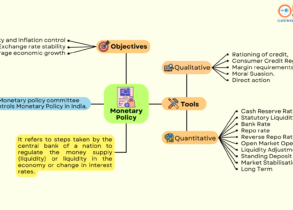Q. Bringing out the various functions of money, mention its advantages over other types of assets.
| Approach
● Give a brief definition of money. ● Mention various functions of money. ● List down the advantages of money over other types of assets. ● Conclude accordingly. |
Answer
Money is an economic unit that functions as a generally recognized medium of exchange for transactional purposes in an economy. Economically, each government has its own money system.
Following are the various functions of money:
- Medium of exchange: It means the money acts as an intermediary between the buyer and the seller.
- A convenient unit of account: The value of almost all goods and services can be expressed in monetary units.
- Acts as a store of value for individuals: Wealth can be stored in the form of money for future use. However, to perform this function well, the value of money must be sufficiently stable. A rising price level may erode the purchasing power of money.
- Standard of deferred payment: This means that if money is usable today to make purchases, it must also be acceptable to make purchases today that will be paid in the future.
Advantages of money over other types of assets:
Liquidity
- Money is considered the most liquid form of asset which can be readily exchanged for other types of assets.
- Other assets like gold, landed property, houses or even bonds may not be easily convertible to other commodities and do not have universal acceptability.
Acceptability
- Money is acceptable to anyone at any point of time because of being a legal tender.
- For instance, in the barter system, there used to be issues of the double coincidence of wants.
Durability
- Unlike the perishable items (food grains, fruits, etc.) in the case of barter, money is relatively more durable. However, there are soil rates in the case of the currency notes too.
Portability
- It means that the money can be conveniently carried from one place to another.
- This was not in the case of other assets in the barter system.
- For instance, to carry out a transaction in the barter system, one has to take a bullock cart (to carry the food grains) along with him/her.
Stability
- Money is relatively stable when compared with, say, cryptocurrencies. For example, the volatility associated with cryptocurrencies brings additional risks for the end-users.
Uniformity
- In barter exchange, the assets for exchange are not uniform. However, the currency of a particular denomination (for e.g. Rs. 10) is all of the same size, shape, and value.
Fungibility
- A 20-rupee note can be easily exchanged for other denominations, say – 10, 5 etc. However, an animal for exchange in the case of a barter system, on the other hand, cannot be considered fungible.
- The presence of money in the market is a determinant of the economic condition of a country and it is regulated by the concerned Central Bank.




